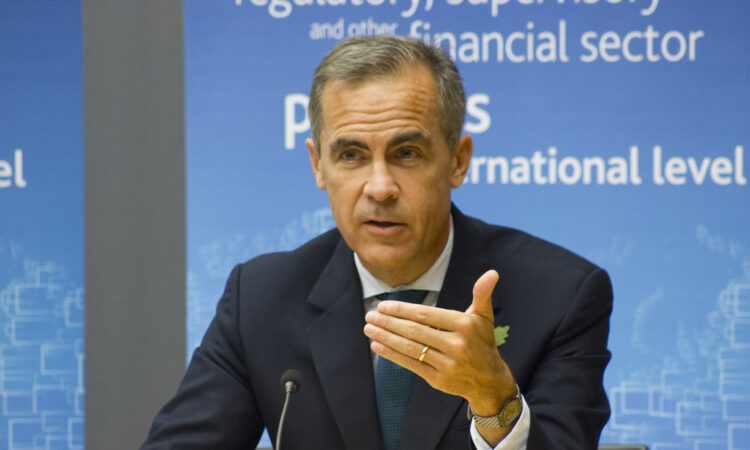
Carney says UK regulators are falling behind on green finance, Hong Kong considers making its green taxonomy mandatory, Egypt’s Sherif Lokman urges NGFS to foster cross-border knowledge on climate risk, plus more in Green Central Banking’s latest roundup.
Carney: UK financial watchdogs need refreshed green mandates
The UK is losing its place as a green finance pioneer and should stop dragging its feet on mandatory reporting, warned Mark Carney, former Bank of England (BoE) governor.
The government should refresh the BoE’s mandates to support the UK’s net-zero commitments, and require transition plan disclosures to support oversight and climate stress testing, he said in a speech at a Deloitte event earlier this month.
Under Jeremy Hunt’s chancellorship, the UK government removed climate change from a list of key BoE priorities, while progress on green finance rules has further stalled due to the upcoming general election on 4 July.
As low-carbon progress is now a fundamental driver of financial competitiveness, Carney cautioned that British markets may suffer if the country does not “get on” with adopting International Sustainability Standards Board (ISSB) standards. The UK recently delayed its adoption of the standards, meaning rules won’t be in force until 2027, whereas the EU, Japan, Hong Kong and Singapore’s rules will be in place next year.
Carney’s comments align with an open letter from over 400 climate experts urging politicians to adopt an ambitious climate programme to meet international responsibilities and promote prosperity if elected.
HKMA considering making new green taxonomy mandatory for banks
A senior official at the Hong Kong Monetary Authority (HKMA) has stated the monetary authority may make its new green taxonomy mandatory for banks, according to the South China Morning Post. The HKMA issued a voluntary green taxonomy last month, targeting interoperability with EU, China, and ASEAN taxonomies to promote sustainable investments and facilitate trade in global markets.
“By providing a common language and framework for sustainable finance, we are equipping market participants with an important tool to make informed decisions, drive impactful cross-border investments, and contribute to global efforts in combating climate change,” said Eddie Yue, chief executive of the HKMA.
The HKMA’s taxonomy is the first to draw on the Common Ground Taxonomy (CGT) methodology, which aims to promote consistent and comparable data on the financial sector’s climate exposure. The CGT maps areas of alignment between the EU and China’s green taxonomies.
Hong Kong’s taxonomy has received some criticism for diverging from the recommendations of its co-partner, the Climate Bonds Initiative, on waste management and construction.
However, HKMA officials have stressed that the taxonomy is a “living document” and it plans to explore additional features in the future, including whether its application will be mandatory.
National Bank of Cambodia spotlights its green finance drive during international central bank meeting
Chea Serey, governor of the National Bank of Cambodia (NBC), highlighted the bank’s pivotal role in the country’s work to address climate change during a recent international meeting of central bankers. Serey discussed the nuances of central bank independence in emerging economies and what Cambodia had done to improve green financing, including implementing a sustainability bond investment swap.
The governor emphasised the need for central banks to combat climate change with sustainable financing in banking systems and international reserve investments. Under Serey’s leadership, the NBC co-developed a sustainable finance roadmap and has taken steps to build internal capacity on climate change, including training staff and developing climate risk assessment frameworks.
The NBC is also currently collaborating with other government agencies and international partners to develop climate-related regulations, such as a green taxonomy, and support sustainable finance initiatives.
Egypt leverages NGFS membership to advance climate risk integration
The Central Bank of Egypt (CBE) has steadily advanced its climate risk capacity over recent years, leveraging its membership in the Network for Greening the Financial System (NGFS) to improve sustainability guidelines and practices, Sherif Lokman, Financial Inclusion and Sustainability bank sub-governor, said in a recent interview.
Stress tests using NGFS climate scenarios have helped “guide the CBE in advising banks on enhancing their risk management practices, particularly in terms of incorporating climate risks into their strategic planning and decision-making processes”.
The CBE joined the network of green central bankers in 2022 and has participated in several NGFS working groups, which have informed Egypt’s own sustainability efforts, Lokman said. That includes binding climate regulations which require banks to regularly report on compliance with sustainability principles and to engage an independent environmental consultant to review risk on large corporate projects.
Lokman also recommended the NGFS could improve by developing simplified climate stress tests for emerging markets, fostering cross-border knowledge sharing on climate risk management, and supporting widespread adoption of ISSB climate disclosure standards.
LSE’s CETEX centre aims to shape policy responses to netzero supply chain issues
The London School of Economics’ new Centre for Economic Transition Expertise (CETEX) is teaming up with Deutsche Bundesbank and Sustainable Macro to host a conference on the macrofinancial risks of net-zero transition supply chains and nature loss.
The group is considering research submissions for the event, which will bring together academics and policymakers to discuss how central banks, regulators and governments can better manage the risks and opportunities of net-zero supply chains.
The call for papers highlighted the need to understand the macrofinancial dynamics as well as the social and environmental trade-offs of the net zero transition, especially for global south economies facing the most acute impacts.
Key topics include the impact of nature loss on macrofinancial instability, the macroeconomic and social impacts of growing demand for transition-critical minerals, and the opportunities and risks for emerging markets. The conference will be held in October and accepted papers will be announced 10 July.
Reading roundup:
This page was last updated June 24, 2024






